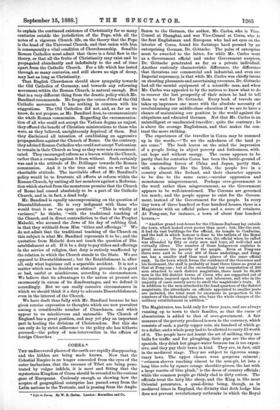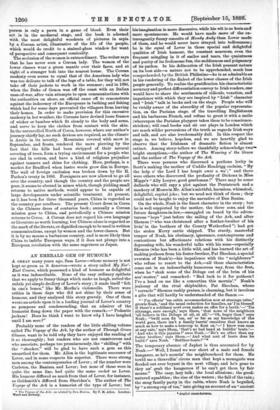COREA.*
THE undiscovered places of the earth are rapidly disappearing, and the hidden are being made known. Now that the Celestial Empire is no longer concealed from the eyes of the outer barbarians, that the recesses of Tibet are being pene- trated by vulgar infidels, it is meet and fitting that the mysterious Kingdom of Corea should be revealed to the curious gaze of Europeans. Curiously enough, as showing how the sceptre of geographical enterprise has passed away from the Latin nations to the Teutonic, and is passing from the Anglo-
• Life in Corea. , By W. B. Carlini. London i Macmillan and Co.
Saxon to the German, the author, Mr. Caries, who is Vice. Consul at Shanghai, and was Vice-Consul at Corea, who is the first Englishman and European who had set eyes on the interior of Corea, found his footsteps hard pressed by an enterprising German, Dr. Gottsche. The palm of enterprise must be awarded to the latter, for while Mr. Caries went as a Government official and under Government auspices, Dr. Gottsche penetrated as far as a private individual. Another curiously characteristic difference, the difference that threatens our commercial and industrial, and even our Imperial supremacy, is that while Mr. Caries was chiefly intent on shooting pheasants and ascertaining revenues, Dr. G-Ottache had all the mental equipment of a scientific man, and when Mr. Carles was appealed to by the natives to know what to do to recover the lost prosperity of their mines, he had to tell them to wait for Dr. Gottsche. Every book of travels one takes up impresses one• more with the absolute necessity of revolutionising our middle-class education if we are to have a chance of maintaining our position in the world against the ubiquitous and educated German. Not that Mr. Caries is an unintelligent or uneducated .traveller ; quite the contrary ; he is above the average Englishman, and that makes the con- trast the more striking.
The experiences of the traveller in Corea may be summed up in the words,—" To see the nakedness of the land ye are come." The book leaves on the mind the impression of a people living in abject poverty and listlessness, with- out hope and without energy. The cause appears to be partly that for centuries Corea has been the battle-ground of the contending forces of China and Japan, partly that, with a character like the Irish, the people live in a country almost like Ireland, and their character appears to be due to the same cause,—secular oppression and monotonous misgovernment. Perhaps over-government is the word rather than misgovernment, as the Government appears to be well-intentioned. The Coreans are governed too much ; and the people appear to exist for the Govern-
ment, instead of the Government for the people. In every
tiny town of three hundred or four hundred houses, there is a Magistrate with an official palace and a score of retainers. At Pong-san, for instance, a town of about four hundred
houses,— "Another grand rest-house for the Chinese Embassy lay outside the town, which looked even poorer than most ; but, like the rest, it had its vast buildings for the official, its temple to Confucius, and the hall in which honour is done to the tablets of the Royal
Family Poor as the town was, the official when he called was attended by fifty or sixty men and boys, all well-clad and virtually idlers. The number of these hangers-on explains in great measure the poverty of the people. Even at Pong-san there were said to be over 200 of these underlings, and Pong- san has a smaller staff than most places of the same official rank. In the town which forms the residence of the Governor and his lieutenant, the staff is probably at least three times as great as that at Pong-san ; but at the exceedingly low computation of 200 men attached to each district magistrate, there must be 66,400 men in the 332 district towns of Corea who are supported out of the taxation imposed upon traders and labourers, and who in the majority of cases merely serve to swell the magistrate's train. If, in addition to the men attached to the head-quarters of the district magistrate, the attendants on officials appointed to smaller posts are included, the total must be enormous in proportion to the numbers of the industrial class, who bear the whole charges of the military establishment in addition."
The Magistrates, too, hold only for three years, and are always running up to town to their families, so that the curse of absenteeism is added to that of over-government. A fair measure of the poverty produced is seen in the currency, which consists of cash, a partly copper coin, six hundred of which go to a dollar, and a whole pony had to be allotted to carry 25 worth of it. The people have not learnt the art of milking, they use bulls for traffic and for ploughing, their pigs are the size of spaniels, they drink hot ginger-water because tea is too expen- sive, and they pay their taxes in kind. They are, in fact,' still in the mediaeval stage. They are subject to rigorous sump- tuary laws. The upper classes wear gorgeous raiment ; "crimson sleeves reaching almost to the arm-pit, let into a long blue robe by square orange shoulder-pieces, the hat with a large rosette of blue plush," is the dress of country officials ; while the common people go thinly clad in dirty cotton. The officials treat the laity like sheep, and the King is, like most Oriental potentates, a quasi-divine being, though, as in mediaeval times in England, the divinity that doth hedge him does not prevent revolutionary outbreaks in which the Royal person is only a pawn in a game of blood. Even their art is in the mediaeval stage, and the book is adorned with the most delightful woodcuts of pictures in sepia by a Corean artist, illustrative of the life of the people, which would do credit to a stained-glass window for want of perspective and consequent comicality.
The seclusion of the women is extraordinary. The writer says that he has never seen a Corean lady. The women of the lower classes wear a green mantle over their faces, and at sight of a stranger bolt into the nearest house. The Corean modesty even seems to equal that of the American lady who was too delicate to talk of the legs of a table, for they will not take off their jackets to work in the summer; and in 1::0, when the Duke of Genoa was off the coast with an Italian man-of-war, after vain attempts to open communications with the authorities on shore, an official came oft to remonstrate against the indecency of the Europeans in bathing and fishing which had for some days prevented the villagers from leaving their homes. In order to make provision for this excessive modesty in hot weather, the Coreans have devised loose frames of wicker or bamboo which fit closely to the body and arms, and serve to keep the clothes from contact with the skin. In the untravelled North of Corea, however, where our author's journey chiefly lay, no such devices are required, as the climate is Arctic in its severity. Mountains covered with snow in September, and frosts, rendered the more piercing by the. fact that the hills had been stripped of their natural covering of trees, form a trying environment for a people who are clad in cotton, and have a kind of religious prejudice against tanners and skins for clothing. Here, perhaps, is a market for Bradford when lustre wools grow dim in Europe. The wall of foreign exclusion was broken down by Sir H. Parkes's treaty in 1883. Foreigners are now allowed to go all over the country, and though the country and the people are poor, it seems to abound in mines which, though yielding small returns to native methods, would appear to be capable of large developments under scientific treatment. At present, as it has been for three thousand years, China is regarded as the country par excellence. The present Court dress in Corea is the Chinese dress of centuries back ; annually a Corean mission goes to China, and periodically a Chinese mission returns to Corea. A Corean does not regard his own language or literature as worth learning, but Chinese alone is regarded as the mark of the literate, or dignified enough to be used in written communications, except by women and the lower classes. But it is by no means a barbarous country, and is more likely than China to imbibe European ways, if it does not plunge into a European revolution with the same eagerness as Japan.



































 Previous page
Previous page